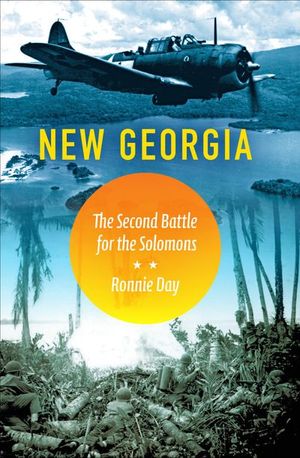New Georgia
“A detailed, up-to-date, integrated air-land-sea history” of a pivotal WWII campaign in the Pacific from both American and Japanese perspectives (Vincent P. O'Hara, author of In Passage Perilous).
In 1942, the Solomon Islands formed the stepping stones toward Rabaul, the main base of Japanese operations in the South Pacific, and the Allies’ primary objective. The stunning defeat of Japanese forces at the Naval Battle of Guadalcanal in November marked the turning point in the war against Japan and the start of an offensive in the Central Solomons aimed at New Georgia.
New Georgia: The Second Battle for the Solomons tells the story of the land, sea, and air battles fought there from March through October 1943. Making careful and copious use of both Japanese and Allied sources, Ronnie Day masterfully weaves the intricate threads of these battles into a well-crafted narrative of this pivotal period in the war. As Day makes clear, combat in the Solomons exemplified the war in the Pacific, especially the importance of air power, something the Japanese failed to understand until it was too late, and the strategy of island hopping, bypassing Japanese strongholds (including Rabaul) in favor of weaker or more strategically advantageous targets. This multifaceted account gives the fighting for New Georgia its proper place in the history of the drive to break the Japanese defensive perimeter and bring the homeland within range of Allied bombers.
In 1942, the Solomon Islands formed the stepping stones toward Rabaul, the main base of Japanese operations in the South Pacific, and the Allies’ primary objective. The stunning defeat of Japanese forces at the Naval Battle of Guadalcanal in November marked the turning point in the war against Japan and the start of an offensive in the Central Solomons aimed at New Georgia.
New Georgia: The Second Battle for the Solomons tells the story of the land, sea, and air battles fought there from March through October 1943. Making careful and copious use of both Japanese and Allied sources, Ronnie Day masterfully weaves the intricate threads of these battles into a well-crafted narrative of this pivotal period in the war. As Day makes clear, combat in the Solomons exemplified the war in the Pacific, especially the importance of air power, something the Japanese failed to understand until it was too late, and the strategy of island hopping, bypassing Japanese strongholds (including Rabaul) in favor of weaker or more strategically advantageous targets. This multifaceted account gives the fighting for New Georgia its proper place in the history of the drive to break the Japanese defensive perimeter and bring the homeland within range of Allied bombers.
BUY NOW FROM
COMMUNITY REVIEWS

